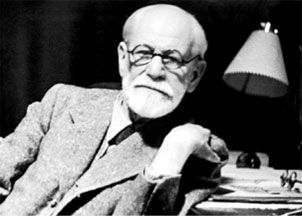Unfolding drama in human psyche
 It was William Shakespeare who said that the world is a stage and we
are actors. Centuries later, the renowned psychoanalyst Sigmund Freud
added a rider to what the Bard had said. According to Freud, there are
three actors within us. They are called the Id, Ego and Superego. It was William Shakespeare who said that the world is a stage and we
are actors. Centuries later, the renowned psychoanalyst Sigmund Freud
added a rider to what the Bard had said. According to Freud, there are
three actors within us. They are called the Id, Ego and Superego.
Everyone of us is a product of competing mental forces. In ancient
Greece, Greeks thought that we are actors in the drama of the gods
above. Sigmund Freud countered it by saying that we are actors in the
drama of our minds. He said we are constantly pushed by desire and
pulled by conscience. Underneath the veneer surface of our
personalities, a power struggle is simmering deep within us.
Id is the seat of our impulses. We have all kinds of impulses,
desires and urges. They are so strong that we are compelled to satisfy
them through ethical or unethical means.
Think of a man who wants to develop a sexual relationship with a
beautiful woman who resists his advances. He will try all the methods of
winning her love. Failing that, he might try to take her away forcibly.
Unknown to him he is driven by the Id which is part of his
personality. If you observe the people around you, you will be surprised
to learn how people pursue their desires without any constraint. Except
saints and arahats, nobody else has devised a method to get rid of
raging desires in the human psyche.
Animal impulses
Some of our desires are basically animal impulses. The indecent
behaviour of young couples in public parks is a case in point. However
much authorities advise them not to behave like animals, such advice
goes unheeded because they are driven by uncontrollable sexual desires.
In other words, the Id is in full control of their lives!
 |
|
Sigmund Freud: the
renowned psychoanalyst |
Such immoral conduct might give the impression that the Id is
something we should get rid of. But we are born with the Id in full
force. So, it is not easy to eliminate it completely.
Religious leaders, philosophers and psychologists may try to control
the power of the Id. However, whether they will succeed in their attempt
is open to question. For instance, a hungry child may break open a
showcase and steal a loaf of bread to satisfy his hunger. When he is
driven by the impulse of hunger, he does not pay any heed to legal and
ethical considerations. In a way, the high rate of crime is partly due
to the Id.
The flip-side of the Id is equally important. A child who studies
hard to become a doctor, lawyer or an author is also driven by the Id.
If he is not driven by impulse, he will never reach his destination. In
fact, all of us, except the mentally depraved, do not want to cut short
our life. We consult doctors, astrologers and palmists to live happily
as long as possible. The Id is the compelling force behind all such
activities.
The Ego
It would be a wonderful world if we could get everything we desire.
Unfortunately, life is full of ups and downs and we fail to achieve
certain targets however much we try. You will hardly find a man or a
woman who has achieved everything in life. When we fail to realise our
dreams, we feel unhappy. Who or what is responsible for our unhappiness?
As we cannot put the blame on the Id, we try to hold the Ego responsible
for our plight.
According to psychologists, the Ego is the second most important
mental apparatus of personality. Unknown to most of us, the main
function of the Ego is to mediate between the demands and pressures of
the external world around us imposed by the Id. When the Id pushes us to
achieve certain things in life, the Ego tells us in no uncertain terms
that we cannot always get everything we want. This is a kind of
balancing act that goes within our personality. If there were no Ego, we
would ruin ourselves by trying to get everything we desire.
When the Ego is trying to do a balancing act with the Id, the
Superego is waiting to pass judgement. The Superego is nothing but our
conscience, the small voice that comes from within. It always does its
duty when the Id tends to run berserk.
The Superego
The Superego or the conscience is nourished by our parents, teachers,
peers and opinion makers. As children we imbibe religious values and as
adults we try to uphold them. Even if we happen to break a law or a
moral principle, we feel guilty. This happens because we have been
conditioned by social mores. For instance, a savage who has not been
exposed to religion or ethics will not hesitate to kill his fellowman on
the slightest provocation.
Sometimes we wonder why even educated and cultured people commit
heinous crimes. Psychologists believe that such people do not have the
capacity to feel guilty. As one well-known psychiatrist put it, “Evil
men do what good men only dream of.” One consolation we have is that
those who commit crimes belongs to a minority. The majority are
law-abiding men and women who are a blessing to the world.
|

